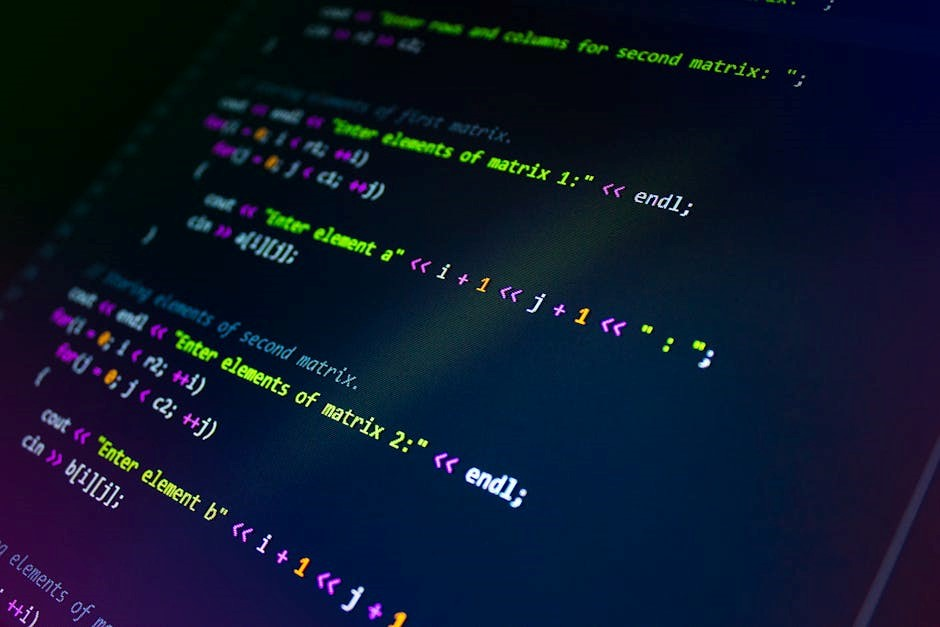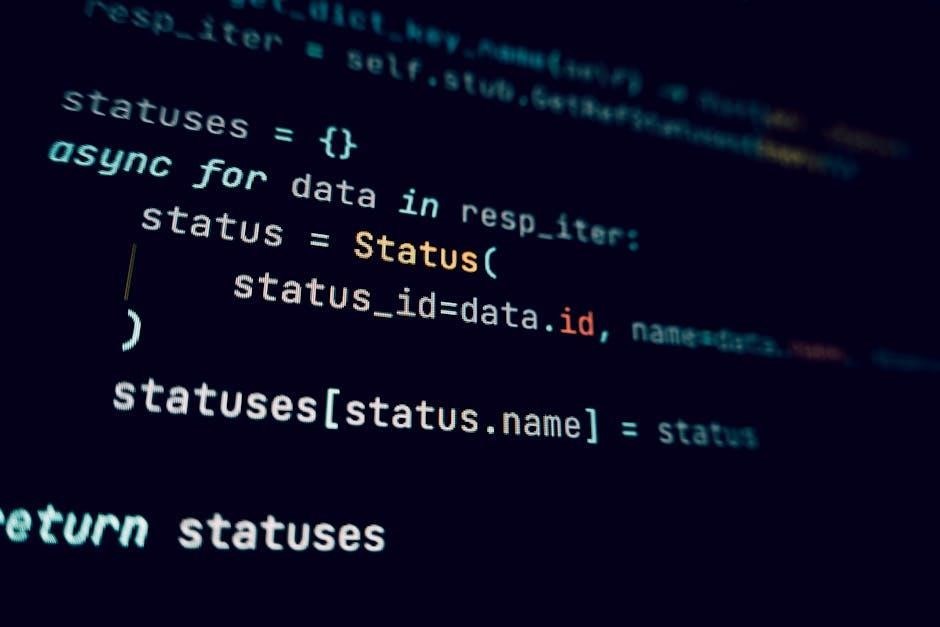The 12th edition of Concepts of Programming Languages by Robert W. Sebesta provides a comprehensive introduction to fundamental principles, introducing Swift and Delphi, with digital resources for enhanced learning.
Overview of the Book and Its Importance
Concepts of Programming Languages, 12th Edition, by Robert W. Sebesta, is a cornerstone in computer science education. It introduces fundamental principles of programming languages, preparing students for both practical coding and theoretical studies. The book covers syntax, semantics, and pragmatics, with a focus on contemporary languages like Swift and Delphi. Its comprehensive approach makes it essential for understanding programming language design and evolution, serving as a valuable resource for learners and professionals alike.

Goals and Structure of the 12th Edition
Primary Objectives of the Book
The book introduces fundamental programming language concepts, evaluates contemporary languages, and prepares students for future language design and compiler study.
The primary objectives of the 12th edition are to introduce the fundamental concepts of programming languages, evaluate contemporary languages, and prepare students for future language design and compiler study. It focuses on providing a deep understanding of language constructs, their syntax, semantics, and pragmatics, while incorporating updates like Swift and Delphi to reflect modern programming trends. The book aims to equip students with analytical skills to evaluate and adapt to new languages in the ever-evolving field of computer science.

Overall Structure and Approach
The 12th edition is structured to logically progress from foundational concepts to advanced topics, ensuring a clear understanding of programming languages. Chapters are organized to analyze language constructs, their design, and implementation. The book emphasizes the separation of syntax, semantics, and pragmatics, while incorporating discussions on contemporary languages like Swift and Delphi. This approach ensures students gain both theoretical knowledge and practical insights, preparing them for future language developments and compiler design studies.

Key Features of the 12th Edition
The 12th edition includes new sections on Swift and Delphi, digital resources like VideoNotes, and flashcards. It also features revised content for clearer explanations and engagement.
New Additions: Swift and Delphi
The 12th edition introduces Swift and Delphi, expanding coverage of modern and legacy languages. Swift, a replacement for Objective-C, highlights contemporary design principles, while Delphi showcases dynamic and versatile programming paradigms. These additions provide students with insights into cutting-edge and established language constructs, enriching their understanding of programming language evolution and practical applications in diverse computing environments. These sections are integrated seamlessly to align with the book’s focus on foundational and emerging language concepts.
Revisions and Clarifications in Existing Content
The 12th edition includes revisions to enhance clarity and accuracy. Sections like 5.5.3 were rewritten to correct and improve explanations, ensuring deeper understanding. Additionally, outdated content, such as Section 2.18.6 on Lua, was removed to maintain relevance. These changes reflect a commitment to refining the textbook, providing students with precise, up-to-date information while preserving the core principles and structure that have made the book a trusted resource in programming education.

Programming Language Concepts Covered
The 12th edition explores fundamental concepts like syntax, semantics, and pragmatics, covering languages such as C, Java, Python, Swift, and Delphi, while preparing students for future languages and compiler design.
Contemporary Language Constructs
The 12th edition delves into modern language constructs, including Swift and Delphi, while exploring functional programming, object-oriented concepts, and scripting languages like Python. It discusses memory management, concurrency, and type systems, providing insights into design choices and their implications. The text also examines how these constructs support emerging trends, enabling students to evaluate and adapt to future programming languages effectively in the evolving tech landscape.
Foundations for Compiler Design
The 12th edition provides a robust foundation for understanding compiler design by exploring the syntax, semantics, and pragmatics of programming languages. It delves into language structures, such as parsing techniques and semantic analysis, preparing students to grasp compiler construction. Discussions on intermediate code generation and optimization highlight the practical applications of these concepts, making it an essential resource for those pursuing compiler design and related fields in computer science.

Changes in the 12th Edition
The 12th edition introduces Swift and Delphi, updates language discussions, and clarifies concepts for better understanding, while removing outdated sections to maintain relevance and focus.
Added Sections: Swift and Delphi
The 12th edition introduces new sections on Swift and Delphi, expanding coverage of modern programming languages. Swift, a replacement for Objective-C, is highlighted for its efficiency and modern design, while Delphi is explored for its object-oriented and multi-platform capabilities. These additions reflect the evolving landscape of programming, ensuring readers gain insights into cutting-edge tools and their applications. These sections enhance the book’s relevance and prepare learners for future language evaluation and design.
Removed and Revised Content
In the 12th edition, outdated content was removed, such as Section 2.18.6 on Lua, to maintain relevance. Revisions include clarifications in Section 5.5.3 for better understanding. Discussions on functional programming constructs were relocated to earlier chapters for improved flow. These adjustments ensure the text remains current and enhances the learning experience by focusing on essential and modern programming concepts.

Theoretical Foundations of Programming Languages
Explores syntax, semantics, and pragmatics, providing a robust understanding of programming language design principles and their practical implications for developers and language designers alike.
Syntax, Semantics, and Pragmatics
The 12th edition delves into the theoretical pillars of programming languages: syntax, semantics, and pragmatics. Syntax explores the structural rules of language, while semantics defines the meaning of constructs. Pragmatics focuses on practical usage and effectiveness. These foundational concepts enable programmers to understand, evaluate, and design languages effectively, bridging theory with real-world applications and future language development.
Design Issues in Language Constructs
The 12th edition examines key design issues in programming language constructs, such as simplicity, orthogonality, and scalability. It explores how languages like Swift and Delphi balance these factors to support various paradigms. Practical examples illustrate trade-offs in design, enabling readers to critically evaluate and understand the rationale behind language features. This focus helps programmers appreciate the complexity of language design and its impact on software development.
Practical Applications and Industry Relevance
The 12th edition bridges theory and practice, showcasing real-world applications of programming languages in industries like AI, data science, and web development, ensuring relevance to current trends.
Real-World Use Cases
The 12th edition highlights practical applications of programming languages in industries like AI, web development, and mobile apps. Languages such as Python, Swift, and Delphi are showcased through real-world examples, illustrating their use in data science, iOS development, and cross-platform applications. Java and C++ are emphasized for enterprise and systems programming, while JavaScript dominates web and mobile development. These examples bridge theory and practice, preparing students for industry challenges and modern programming scenarios.
Preparation for Future Languages
The 12th edition equips students with a deep understanding of programming principles, enabling them to adapt to emerging languages. By focusing on fundamental concepts and design patterns, the book ensures readiness for future languages. Coverage of Swift and Delphi, along with updates in language constructs, prepares learners for evolving trends in software development and the demands of new technologies.
Teaching Approach and Resources
The 12th edition offers a comprehensive teaching approach with digital resources, including VideoNotes and Flashcards, to enhance learning and retention of programming language concepts effectively.
Digital Resources and Supplements
The 12th edition provides extensive digital resources, including VideoNotes, Flashcards, and an eTextbook with a 14-day refund guarantee. These tools enhance learning by offering step-by-step video tutorials, practice problems, and mobile access to content. The subscription model ensures flexibility, with access to a wealth of materials designed to support both desktop and mobile learning experiences, making it easier for students to engage with the material anytime, anywhere.
Access to VideoNotes and Flashcards
The 12th edition offers exclusive access to VideoNotes and Flashcards, providing students with interactive tools to reinforce learning. VideoNotes deliver step-by-step explanations of key concepts, while Flashcards aid in memorizing terminology and principles. These resources are accessible through a subscription, ensuring students can review and practice anytime, enhancing their understanding of programming language concepts effectively.
The 12th edition concludes with a comprehensive review of programming language concepts, introducing Swift and Delphi, and providing digital resources to greatly enhance learning and understanding.
The 12th edition of Concepts of Programming Languages covers fundamental principles, including syntax, semantics, and pragmatics. It explores language constructs, such as data types and control structures, and introduces Swift and Delphi as modern examples. The book prepares readers to evaluate and adapt to emerging languages, emphasizing both theoretical foundations and practical applications, making it a valuable resource for understanding programming language design and evolution;
Final Thoughts on the 12th Edition
The 12th edition of Concepts of Programming Languages remains a cornerstone for understanding programming language design. With additions like Swift and Delphi, it bridges modern and traditional languages. Enhanced with digital tools, it offers practical learning aids, making it indispensable for students and professionals alike. This edition strikes a balance between theory and practice, ensuring readers gain both foundational knowledge and the ability to adapt to future programming challenges.